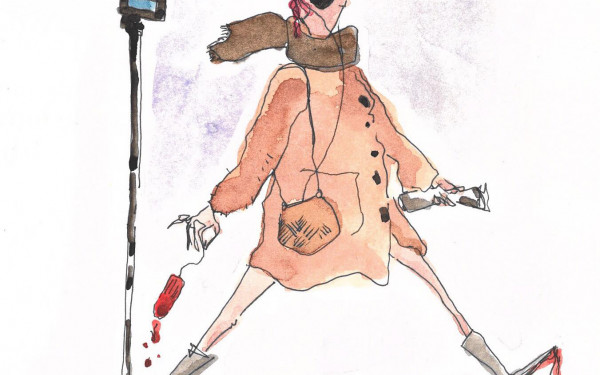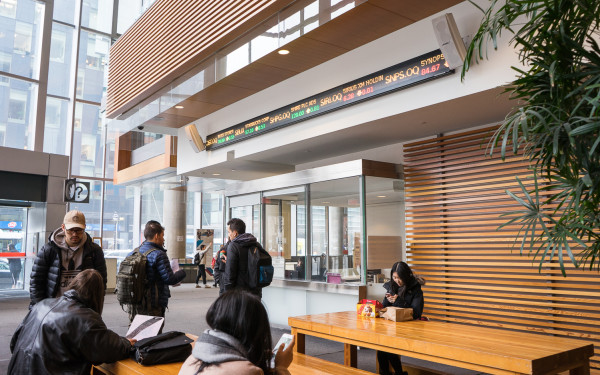Fighting Period Poverty on Campus
Students Demand Increased Menstrual Equity From Concordia
An idea for a menstrual equity project came from a time of immense inconvenience.
Danielle Lavigne unexpectedly got her period while she was in class. Rushing to the bathroom, she realized she had no menstrual products on her, or coins to buy a tampon from the dispenser.
Reluctantly, she had to resort to using toilet paper as a makeshift pad. Frustrated with her experience, she decided to be a voice of change.
A third-year English and psychology student at Concordia University, Lavigne said she believes free products are a necessity, and that implementing this policy is a matter of principle and equity. “I want to fight period poverty at Concordia,” she said, “but also make sure that people have period products easily accessible when needed.”
In order to spread the word, Lavigne created the Instagram account Free Periods Concordia, where she speaks on the issue. She also created a petition urging Concordia to make a change.
In March 2022, the University of Toronto launched a project to provide free sanitary pads and tampons for students and staff. The university pledged to install menstrual hygiene product dispensers in 75 women’s, men’s and gender-inclusive washrooms in seven of the campus buildings.
According to a recent study, nearly a quarter of Canadian women under 25 years old face financial hardship when buying period products. Instead of support, people who menstruate across Canada face systemic challenges in accessing necessary hygiene products.
Period poverty is defined as “the struggle many low-income women and girls face while trying to afford menstrual products” by the United Nations Population Fund.
While some Canadian institutions are quickly moving towards the right direction, the Concordia Student Union says that others, like Concordia, are moving at a snail’s pace. Hoping to improve access to menstrual products on both campuses, students and student unions have been urging the university to do their part.
Lavigne is not alone in fighting for menstrual equity on campus. Both the CSU and the Arts and Science Federation of Associations have been trying to destigmatize the topic of menstruation. One of their primary methods has been to give out free period products.
Since 2018, ASFA has ensured to have period products available for free in their offices with a no-ask rule, meaning anyone can take as many supplies without worrying they will be questioned.
“Toilet paper is free and it’s a sanitary product. The university should be meeting the needs of students for free pads and tampons, which are also sanitary products.” — Payton Mitchell
According to Payton Mitchell, ASFA’s communications coordinator, the association demands the university be more accessible. “Toilet paper is free and it’s a sanitary product. The university should be meeting the needs of students for free pads and tampons, which are also sanitary products,” she explained.
The CSU has also been very active in Concordia’s menstrual equity space. After the union’s sustainability committee voted in favour of launching the distribution of free Diva Cups during the 2020-2021 term, over 500 were given out to students that year. Thanks to this initial success, the project continues receiving annual funding from the union to keep operations running.
Diva Cups and reusable pads can be picked up at the Zen Dens (GM 300.22 downtown and CC 403 at Loyola) and CSU offices (H-711 downtown and CC-426 at Loyola) on both campuses as part of Concordia’s initiative to reduce menstrual inequities, according to Concordia Spokesperson Vannina Maestracci.
Even though the university has dabbled in period equity, accessibility is still a major issue. According to Asli Isaaq and Sabrina Morena, the CSU’s academic and advocacy coordinator and Loyola coordinator respectively, there is still a lot of work to be done.
Together, the two executives are in charge of the union’s project in partnership with the university. The CSU also supplies free disposable tampons and pads at their offices on both campuses.
“As it stands right now, I don't think there are any one-time use products offered anywhere at Concordia, whether that's CSU or another department,” said Morena. The coordinators have been in talks with Concordia Wellness Coordinator Jillian Ritchie and Concordia Health Promotion Specialist Gabriella Szabo about potentially buying period panties to distribute for free.
When it comes to the future of period equity at Concordia, Morena and Isaaq are not too hopeful. “We have been trying to get in contact with facilities management to see what the long-term plan is and if we could even implement free dispensers,” Morena said. “So far, it's just been a game of catch. We've had meetings scheduled and then later postponed.”
As of recently, Ritchie is set to work in collaboration with Lavigne to help expand her project. According to the wellness coordinator, the CSU and Sustainability Action Fund have been advocating for free period product dispensers across both campuses since 2021. The collaboration between Ritchie and Lavigne will further help tighten the gap of period inequality on campus.
Lavigne urged students to sign her petition to increase the chances of Concordia adopting such a policy. “Students should not have to worry about accessing menstrual products,” she said.
When asked by The Link if Concordia had plans for free menstrual product dispensers in bathrooms, Maestracci did not engage with the question.
This article originally appeared in Volume 43, Issue 8, published December 6, 2022.






